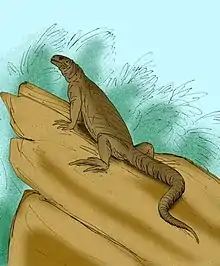| Polrussia Temporal range: Late Cretaceous | |
|---|---|
| Scientific classification | |
| Domain: | Eukaryota |
| Kingdom: | Animalia |
| Phylum: | Chordata |
| Class: | Reptilia |
| Order: | Squamata |
| Suborder: | Iguania |
| Clade: | †Gobiguania |
| Genus: | †Polrussia Borsuk-Białynicka and Alifanov, 1991 |
| Type species | |
| †Polrussia mongoliensis Borsuk-Białynicka and Alifanov, 1991 | |
Polrussia is an extinct genus of iguanian lizards dating to the Late Cretaceous epoch, found in what is now Mongolia. It belongs to a group of extinct iguanians called Gobiguania that was endemic to the Gobi Desert during the Late Cretaceous. The type species Polrussia mongoliensis was named in 1991 on the basis of a skull found in the Barun Goyot Formation. The genus name refers to the Polish and Russian paleontologists who worked together to find and describe the material. Polrussia has a short skull, slightly pointed and flattened snout, and large eye sockets. The teeth each have one cusp, as opposed to the multiple cusps seen in some other gobiguanians. The skull is only 1.2 centimetres (0.47 in) long, making Polrussia one of the smallest gobiguanians.[1]
Below is a cladogram from Daza et al. (2012) showing the phylogenetic relationships of Polrussia:[2]
| Iguania |
| ||||||||||||||||||||||||||||||||||||||||||||||||||||||||||||||||||||||||||||||||||||||||||||||||||||||||||||||||||||||||||||||||||||
References
- ↑ Borsuk-Białynicka, Magdalena; Alifanov, Vladimir R. "First Asiatic 'iguanid' lizards in the Late Cretaceous of Mongolia". Acta Palaeontologica Polonica. 36 (3): 325–342.
- ↑ Daza, J. D.; Abdala, V.; Arias, J. S.; García-López, D.; Ortiz, P. (2012). "Cladistic Analysis of Iguania and a Fossil Lizard from the Late Pliocene of Northwestern Argentina". Journal of Herpetology. 46: 104–119. doi:10.1670/10-112. hdl:11336/61054. S2CID 85405843.
